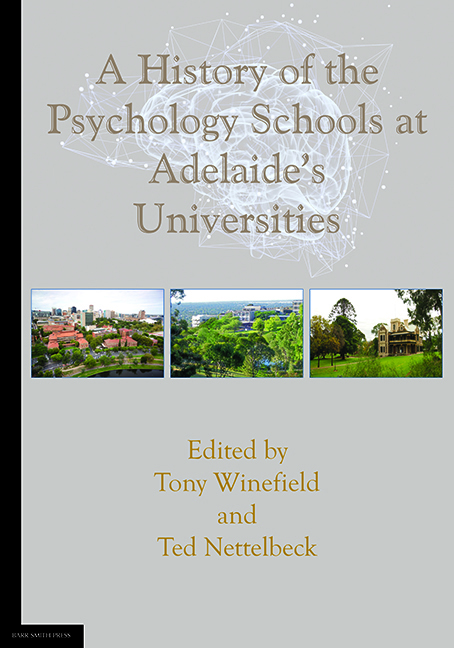Book contents
- Frontmatter
- Contents
- List of contributors
- Preface
- 1 Introduction
- 2 The origins and early history of the University of Adelaide's School of Psychology
- 3 The later years
- 4 Teaching applied psychology at the University of Adelaide: A personal view
- 5 Flinders University: Psychology in the twentieth century
- 6 Recent history of Flinders School of Psychology
- 7 The history of Psychology at the University of South Australia: From little things big things grow
- 8 The history of Psychology at the University of South Australia: Recent history
2 - The origins and early history of the University of Adelaide's School of Psychology
Published online by Cambridge University Press: 25 July 2017
- Frontmatter
- Contents
- List of contributors
- Preface
- 1 Introduction
- 2 The origins and early history of the University of Adelaide's School of Psychology
- 3 The later years
- 4 Teaching applied psychology at the University of Adelaide: A personal view
- 5 Flinders University: Psychology in the twentieth century
- 6 Recent history of Flinders School of Psychology
- 7 The history of Psychology at the University of South Australia: From little things big things grow
- 8 The history of Psychology at the University of South Australia: Recent history
Summary
Part 1: 1955-69
Malcolm Jeeves
The late 1950s and the 1960s were a time of very rapid expansion and development for the University of Adelaide. The vice-chancellor in the 1950s, AP Roe, had embarked on a policy of headhunting worldwide for young leaders in various academic disciplines. For example, in the late 1950s he had appointed Hugh Stretton, dean of an Oxford College, as professor of history; John Trevaskis, a Cambridge classicist, as professor of classics; Jack Smart, a distinguished Oxford philosopher, as professor of philosophy; and Henry Bennett, a Cambridge geneticist and student of RA Fisher, as professor of genetics. In 1959, seemingly continuing this practice, AP Roe's successor, Henry Basten, appointed Malcolm Jeeves, a Cambridge-trained psychologist aged thirty-two, to the newly created chair of psychology.
But this was not the beginning of psychology at the University of Adelaide. We are fortunate that, in an earlier publication by the Adelaide University Union Press of a book by Norman Munn entitled Being and becoming: An autobiography (1980), we have a number of references to the way in which psychology developed in the years before 1960. Norman Munn was born in South Australia in 1902, but in 1923 went off to North America for his education and to make his name as one of the best-known and most distinguished textbook writers of psychology in the mid-twentieth century.
Pre-1960 psychology at the University of Adelaide
Reporting on a visit to Adelaide in 1948, Munn wrote:
There was still no psychologist at the University of Adelaide, although a course was given in the philosophy department. Mrs Amy Wheaton, a neighbour from my childhood youth, was Lecturer in Sociology and taught a course on Social Psychology in that department. In response to Amy's invitation, I gave a lecture on Personality to her students during this visit. (1980, p. 129)
- Type
- Chapter
- Information
- Publisher: The University of Adelaide PressPrint publication year: 2016



